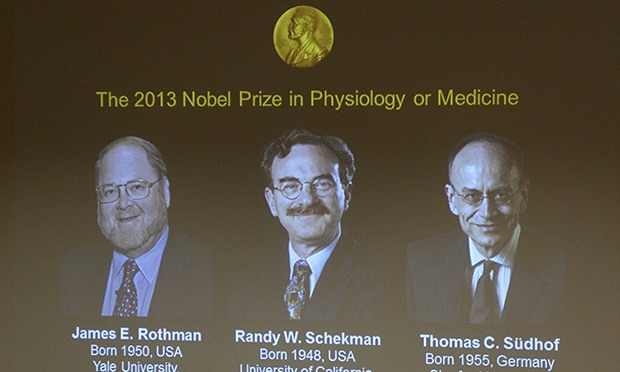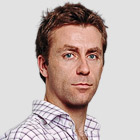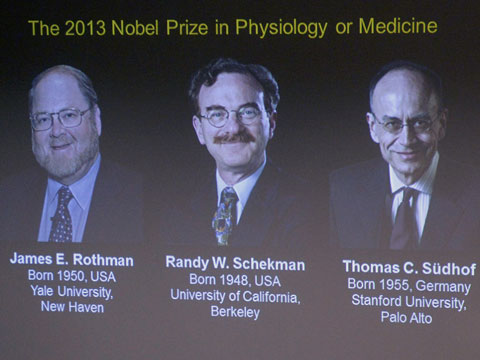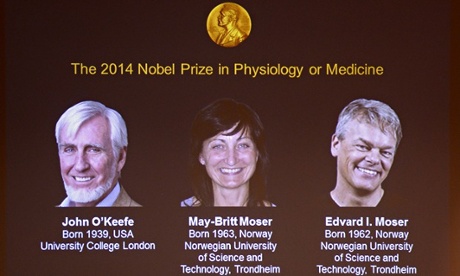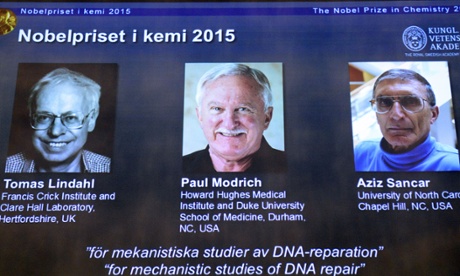That's all for now
And there we have the 2013 Nobel prize in Physiology or Medicine. You can read Alok Jha's news piece summarising today's announcement here. And listen to my interview with Thomas Südhof here. Tomorrow it's time for the physics prize. Will Peter Higgs win for his famous boson? What about the four other surviving scientists who worked on the theory in 1964? What about Cern, the organisation that found the particle with the Large Hadron Collider? Or will the prize go for something completely different, such as exoplanets? Join us tomorrow morning to find out.
Updated
Lunchtime summary
- The 2013 Nobel prize in Physiology or Medicine has gone to James E Rothman (US) at Yale University, Randy W Schekman (US) at UC Berkeley and Thomas Südhof (Germany) at Stanford "for their discoveries of machinery regulating vesicle traffic, a major transport system in our cells".
- Schekman identified three classes of genes that control facets of the cell's transport system.
- Rothman discovered protein complexes that ensure a cell's molecular post is delivered to the right destination.
- Südhof showed how nerve cells communicate with one another with such precision timing.
Reaction from Schekman
The call from Stockholm came at 1.30am for Randy Schekman, professor of molecular and cell biology at the University of California, Berkeley. His institution has just released a statement including this response:
My first reaction was, 'Oh, my god!' That was also my second reaction.
Updated
Thomas Südhof was interested in how nerve cells communicate w one another in the brain & how temporal precision is achieved. #NobelPrize
— Nobelprize_org (@Nobelprize_org) October 7, 2013
James Rothman was intrigued by the nature of the cell's transport system & mapped critical components of the cell's transport machinery.
— Nobelprize_org (@Nobelprize_org) October 7, 2013
Randy Schekman was fascinated by how the cell organizes its transport system & used yeast as a model system. #NobelPrize in Medicine
— Nobelprize_org (@Nobelprize_org) October 7, 2013
What other scientists say
Professor Patrik Rorsman at Oxford University says:
Today’s Nobel Prize is very timely and well deserved. It is such a fundamental process they have studied and explained. I am delighted. Their discoveries could perhaps have clinical implications in psychiatric diseases, but my guess is that they will be more useful for the understanding of how cells work. Since the processes are so fundamental and operate in all cells it will not be easy to target them pharmacologically.
Updated
The 3 scientists awarded the 2013 #NobelPrize in #Medicine have solved the mystery of how the cell organizes its transport system.
— Nobelprize_org (@Nobelprize_org) October 7, 2013
James Rothman was born in 1950 in Haverhill, Massachusetts. Here is an interview with Rothman after winning the 2002 Lasker award for basic medical research.
Randy Schekman was born in 1948 in St Paul, Minnesota. Earlier this year he was elected a Foreign Member of the Royal Society. He is editor of the Wellcome Trust's new open access online journal eLife.
Thomas Südhof is German and was born in 1955, making him bang on the average age for receiving this Nobel prize. Like a number of Nobel laureates, he is a previous recipient of both the Lasker award and the Kavli prize.
Updated
Schekman speaks up for open access
Randy Schekman is a strong advocate of open-access scientific publishing. In December last year, he spoke to Alok Jha on the Guardian's Science Weekly podcast about a new open-access science journal, eLife. He is the editor-in-chief
Updated
The Foundation has been able to reach Rothman and Sheckman – and they are delighted, but the suggestion is they have not yet got through to Südof.
Updated
What did the researchers discover?
Some background material from the Nobel Foundation that describes the work by Rothman, Schekman and Südof:
How cargo is transported in the cell
In a large and busy port, systems are required to ensure that the correct cargo is shipped to the correct destination at the right time. The cell, with its different compartments called organelles, faces a similar problem: cells produce molecules such as hormones, neurotransmitters, cytokines and enzymes that have to be delivered to other places inside the cell, or exported out of the cell, at exactly the right moment. Timing and location are everything. Miniature bubble-like vesicles, surrounded by membranes, shuttle the cargo between organelles or fuse with the outer membrane of the cell and release their cargo to the outside. This is of major importance, as it triggers nerve activation in the case of transmitter substances, or controls metabolism in the case of hormones. How do these vesicles know where and when to deliver their cargo?
Traffic congestion reveals genetic controllers
Randy Schekman was fascinated by how the cell organizes its transport system and in the 1970s decided to study its genetic basis by using yeast as a model system. In a genetic screen, he identified yeast cells with defective transport machinery, giving rise to a situation resembling a poorly planned public transport system. Vesicles piled up in certain parts of the cell. He found that the cause of this congestion was genetic and went on to identify the mutated genes. Schekman identified three classes of genes that control different facets of the cell´s transport system, thereby providing new insights into the tightly regulated machinery that mediates vesicle transport in the cell.
Docking with precision
James Rothman was also intrigued by the nature of the cell´s transport system. When studying vesicle transport in mammalian cells in the 1980s and 1990s, Rothman discovered that a protein complex enables vesicles to dock and fuse with their target membranes. In the fusion process, proteins on the vesicles and target membranes bind to each other like the two sides of a zipper. The fact that there are many such proteins and that they bind only in specific combinations ensures that cargo is delivered to a precise location. The same principle operates inside the cell and when a vesicle binds to the cell´s outer membrane to release its contents.
It turned out that some of the genes Schekman had discovered in yeast coded for proteins corresponding to those Rothman identified in mammals, revealing an ancient evolutionary origin of the transport system. Collectively, they mapped critical components of the cell´s transport machinery.
Timing is everything
Thomas Südhof was interested in how nerve cells communicate with one another in the brain. The signalling molecules, neurotransmitters, are released from vesicles that fuse with the outer membrane of nerve cells by using the machinery discovered by Rothman and Schekman. But these vesicles are only allowed to release their contents when the nerve cell signals to its neighbours. How is this release controlled in such a precise manner? Calcium ions were known to be involved in this process and in the 1990s, Südhof searched for calcium sensitive proteins in nerve cells. He identified molecular machinery that responds to an influx of calcium ions and directs neighbour proteins rapidly to bind vesicles to the outer membrane of the nerve cell. The zipper opens up and signal substances are released. Südhof´s discovery explained how temporal precision is achieved and how vesicles´ contents can be released on command.
Vesicle transport gives insight into disease processes
The three Nobel Laureates have discovered a fundamental process in cell physiology. These discoveries have had a major impact on our understanding of how cargo is delivered with timing and precision within and outside the cell. Vesicle transport and fusion operate, with the same general principles, in organisms as different as yeast and man. The system is critical for a variety of physiological processes in which vesicle fusion must be controlled, ranging from signalling in the brain to release of hormones and immune cytokines. Defective vesicle transport occurs in a variety of diseases including a number of neurological and immunological disorders, as well as in diabetes. Without this wonderfully precise organization, the cell would lapse into chaos.
Updated
James Rothman explains his work
Here's Prof Rothman speaking in December last year.
Updated
Here is a summary from the Nobel Foundation of the scientists' discoveries that led to the prize:
The 2013 Nobel Prize honours three scientists who have solved the mystery of how the cell organizes its transport system. Each cell is a factory that produces and exports molecules. For instance, insulin is manufactured and released into the blood and chemical signals called neurotransmitters are sent from one nerve cell to another. These molecules are transported around the cell in small packages called vesicles. The three Nobel Laureates have discovered the molecular principles that govern how this cargo is delivered to the right place at the right time in the cell.
Randy Schekman discovered a set of genes that were required for vesicle traffic. James Rothman unravelled protein machinery that allows vesicles to fuse with their targets to permit transfer of cargo. Thomas Südhof revealed how signals instruct vesicles to release their cargo with precision.
Through their discoveries, Rothman, Schekman and Südhof have revealed the exquisitely precise control system for the transport and delivery of cellular cargo. Disturbances in this system have deleterious effects and contribute to conditions such as neurological diseases, diabetes, and immunological disorders.
Updated
More on the winners
The affiliations of the winners - a full house for the US.
James E Rothman, Yale University
Randy W Schekman, Berkeley
Thomas C Südhof, Stanford University
Updated
And the winners are...
The winners of the 2013 Nobel prize in Physiology or Medicine are:
James E Rothman
Randy W Schekman
Thomas C Südhof
For elucidating the machinery that regulates vesicle transport through the cell.
Updated
The committee is filtering into the room and taking their seats. Here we go. Someone, somewhere, has just received a very nice telephone call from Stockholm. The chances are that that call arrived at a very early hour of the morning.
I don't have any prizes to hand myself, but if you know the soothing music the Nobel Foundation website is playing I will post your name on our blog. Imagine the fame!
The audience are taking their seats. In 10 minutes they will announce the names of this year's winner, or winners (it's usually plural). With luck, they will have a winner or two on the phone to speak to us all. Let's hope the webcast doesn't crash, as has been known.
Hold on to your hats.
Updated
Live webcast
Winners of the Nobel prize usually rack up a haul of awards before they land the big one. Many already have the Lasker award, and so the list is a good place to look for future Nobel laureates. A former committee secretary told the Guardian last week that one contender this year could be Ingeborg Hochmair, who won this year for her work on designing the cochlear implant. The secretary admittedly had a slight bias, in being somewhat deaf.
A note to young scientists:
Sir John Gurdon's boyhood ambition to become a scientist was dismissed by his Eton schoolmaster as "quite ridiculous".
Gurdon keeps the old school report – now a browning scrap of paper – on his office wall. He told the Guardian last year: "When you have problems, like an experiment doesn't work, which often happens, it's nice to remind yourself that perhaps after all you're not so good at this job, and the schoolmaster might have been right."
Fantastic man, fantastic scientist.
Updated
Who will win the Nobel prize in physiology or medicine? Since 1901 the relevant Nobel committee has awarded the prize to 201 people. Of those, 191 were men. The average age on receiving the prize was 57. The US dominates across the board when it comes to the Nobels. No other country has won at least one prize a year since the second world war.
Updated
Sir John Gurdon, one of last year's winners of the Nobel prize in physiology or medicine
Updated
Nobel season is here once more. Has it really been a year?
The award-giving kicks off this morning with the Nobel prize for physiology or medicine. We expect to hear the name – or names – from the Nobel committee in Stockholm at 10.30am BST.
Last year, Sir John Gurdon at Cambridge, and Shinya Yamanaka, a Japanese researcher with labs in Kyoto and San Francisco, shared the prize for their work on cell reprogramming.
Who will win this year? Could it be Adrian Bird at Edinburgh University for his work on epigenetics? Noboru Mizushima at Tokyo University for unveiling the mechanisms of autophagy, a process by which the body destroys its own cells? Or Dennis Slamon at UCLA for work on the HER-2/neu cancer gene? All are favourites put forward by Thomson Reuters.
Updated
